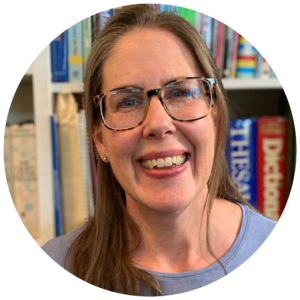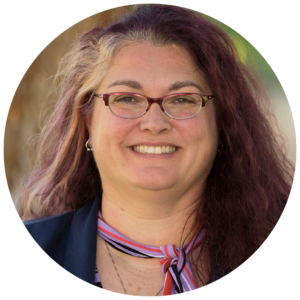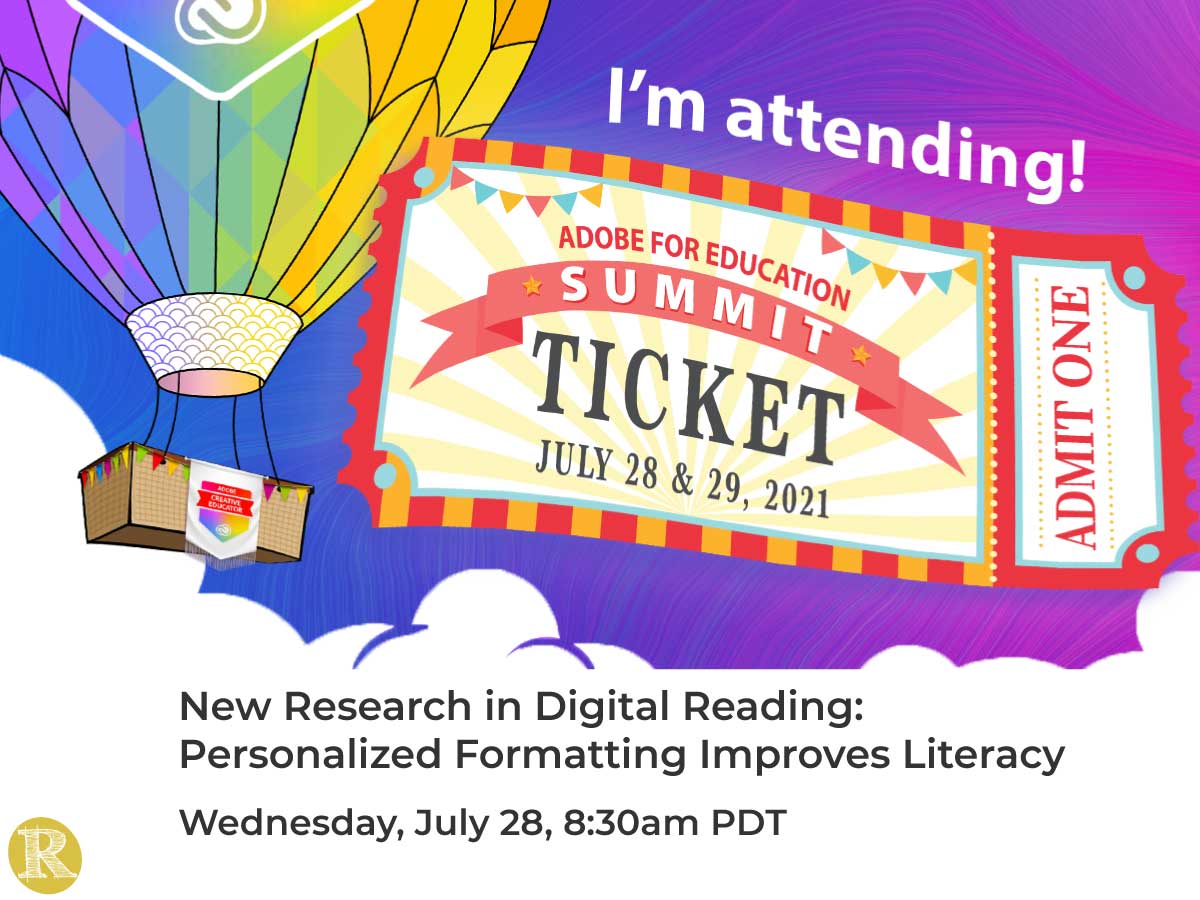New Readability Research Panel at the Adobe for Education Summit
Virtual and Free in 2021!
Join the Wednesday session to learn more about the latest readability research. Small changes to text formats can maximize an individual’s ability to read quickly and accurately, and comprehend more. Digital reading allows the shift from what is best for the population to what is best for the individual reader. New insights will inform the design of better reading applications that can accelerate learning for students of all ages.
Rick will outline Adobe’s investments in better reading. Shaun will discuss his work as the architect of the Virtual Readability Lab. Susanne will preview data coming from a student readability study sponsored by Readability Matters; the study was designed to evaluate the link between enhanced reading experiences and comprehension. Shelley will discuss her research on readability with college students.
Use this link to reserve your spot and register for the event.
Session:
New research in digital reading: How personalized formatting makes everyone a better reader

Rick Treitman, Adobe
Two years ago, at the AEL Summit, Adobe demonstrated an early version of Liquid Mode and introduced our partner, Readability Matters. We described our intention to make reading better for everyone through personalized reading formats. Since that time, we have shipped Liquid Mode in Adobe Reader Mobile, opened a dedicated Readability Lab at the University of Central Florida and kicked off a number of research projects around the world. In this session, three of our researchers will discuss recent and ongoing readability research and its application to our classrooms.

Shaun Wallace, Brown University
The virtual readability lab serves as a platform to bootstrap the education experience for teachers and students alike. The goal of the VRL is to guide users towards their personalized fonts and text formats to augment their reading experiences. Teachers can provide custom sign-up links to review their students’ results from individual tests and monitor their students’ preferences and reading speeds over time. Students can receive personalized recommendations by only taking a single test and receiving further recommendations through continuous participation. The Virtual Readability Lab also works with specialized groups to develop bespoke readability tests. For example, developing digital reading rulers to help readers with and without dyslexia and specific readability tests to help increase the reading speed of adult learners. The Virtual Readability Lab is continuing to innovate on these personalized experiences through future collaborations and research.

Dr. Susanne Nobles, ReadWorks
An innovative interdisciplinary research team recently challenged conventional wisdom by studying how type changes can impact students’ speed of comprehension. Join educator Dr. Susanne Nobles for a discussion on the research results. Customization matters: making small changes to text format to support an individual’s unique visual processing capability can create important changes in a student’s speed of comprehension. (Learn more about Susanne in our interview here.)

Dr. Shelley Rodrigo, University of Arizona
As digital technologies continue to influence instructional design in universities, we need to better understand how readers navigate these resources. Yet we understand very little about how readers experience digital technologies when it can be customized for their readerly practices. This mixed-methods research gathers students’ perspectives of using the Virtual Reading Lab with an emphasis on how students experienced this tool, what they perceive as impacting their reading, and if the tools seem to impact their confidence as readers. The study also collects insights from faculty about these digital tools in their classrooms. As an initial study of the efficacy of the Virtual Reading Lab for instruction design, this research focuses on understanding and defining features of the experience most relevant for future studies. At Adobe EDU Summit we will debut results from our initial participants. (Learn more about Shelley in our interview here.)
ABOUT RICK TREITMAN: Rick started his professional career as a High School English and media teacher and published the first-ever computer-typeset student newspaper in 1975. Rick is currently Entrepreneur-in-Residence for Document Cloud – specializing in Education. Rick’s work as EIR involves early-stage development of tools and solutions for Adobe’s customers. Current projects include readability controls in Acrobat and establishing the Virtual Readability Lab at the University of Central Florida. He was a founder of Virtual Ubiquity, acquired by Adobe in 2007. Virtual Ubiquity created Buzzword, one of the first cloud-based word processors. Prior to VU, Rick was the owner of Softpro Books – a Boston area technical bookstore chain catering to high tech professionals. He was an early employee of Lotus Development where he had several positions including Director of Product Management and Marketing for various product groups. Rick lives in Lexington, MA with his wife, Cantor Louise Treitman. They have three daughters and six grandchildren. When not working, he’s usually on his bike or in the kitchen.
ABOUT DR. SUSANNE NOBLES Susanne Nobles is Chief Academic Officer at the nonprofit ReadWorks. The mission of ReadWorks is to support the growth of successful, joyful readers by providing K-12 teachers with what to teach and how to teach it—online, for free, to be shared broadly. Susanne has spent her career working to empower educators and students with research, structures, and tools for meaningful and effective learning. She led Digital Promise’s collaborative work with developers, researchers, and educators for the Learner Variability Project (LVP). Susanne has also been an adjunct instructor with Relay Graduate School of Education and was a K-12 teacher and administrator for over 20 years. Her Ph.D. research focused on creating effective digital communities of practice, and her scholarly work has appeared in Computers and Composition, Contemporary Issues in Technology and Education, and Teaching/Writing: The Journal of Writing Teacher Education.
ABOUT DR. SHELLEY RODRIGO Rochelle (Shelley) Rodrigo is the Senior Director of the Writing Program, Associate Professor in the Rhetoric, Composition, and the Teaching of English (RCTE); and Associate Writing Specialist (Continuing Status) in the Department of English at the University of Arizona. She researches how “newer” technologies better facilitate communicative interactions, specifically teaching and learning. As well as co-authoring three editions of The Wadsworth/Cengage Guide to Research, Shelley also co-edited Rhetorically Rethinking Usability (Hampton Press). Her scholarly work has appeared in Computers and Composition, C&C Online, Technical Communication Quarterly, Teaching English in the Two-Year College, EDUCAUSE Quarterly, Journal of Interactive Technology & Pedagogy, Enculturation¸ as well as various edited collections. In 2021 she was elected Vice President (4-year term including President) of the National Council of Teachers of English and won the Arizona Technology in Education Association’s Ruth Catalano Friend of Technology Innovation Award, in 2018 she became an Adobe Education Leader, in 2014 she was awarded Old Dominion University’s annual Teaching with Technology Award, in 2012 the Digital Humanities High Powered Computing Fellowship, and, in 2010 she became a Google Certified Teacher/Innovator.
ABOUT SHAUN WALLACE Shaun is the architect and co-creator of the Virtual Readability Lab, where reading researchers develop personalized readability tests and recommendations to help reduce information overload. He is currently completing his Ph.D. at Brown University under the guidance of Jeff Huang. Shaun is a Human-Computer Interaction systems researcher focusing on building remote asynchronous collaboration systems that provide users with personalized recommendations to assist their daily information-seeking behaviors. He started his work on the Virtual Readability Lab as a research intern with Adobe’s Creative Intelligence Lab under the direction of Zoya Bylinskii.




